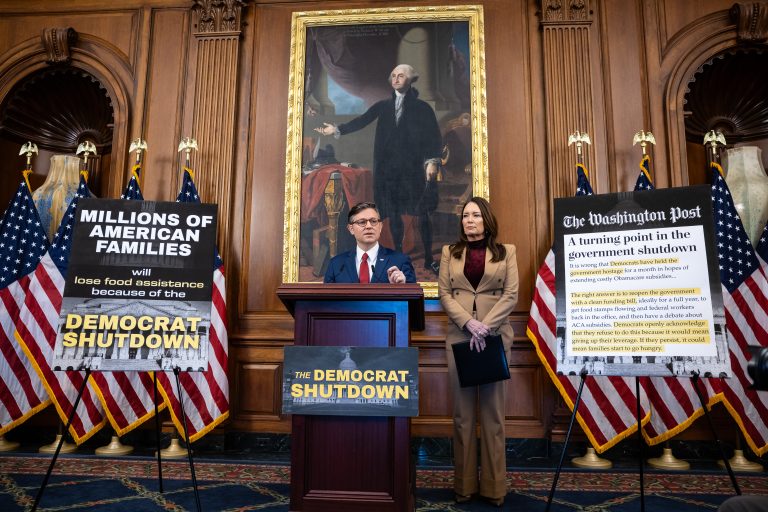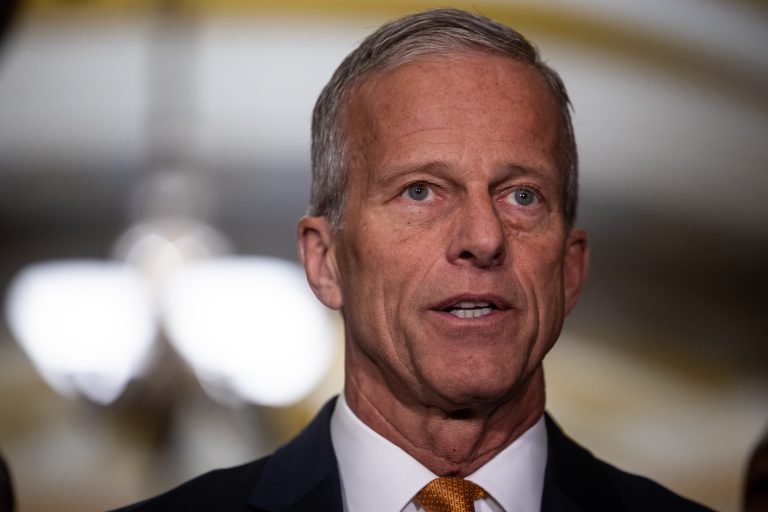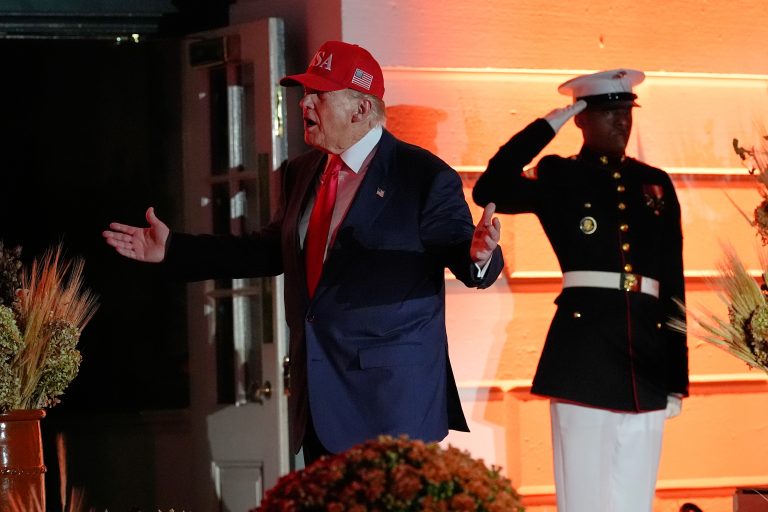Not so long ago, if there was a bipartisan group getting together to solve a problem in the Senate, you could count on Mark Warner to be involved.
The Virginia Democrat was part of the “talking stick” gang that helped quickly end a brief 2018 funding lapse. He was a part of a crew that helped cut a major infrastructure deal under former President Joe Biden, and he’s currently working with Republicans to forge an agreement on cryptocurrency regulation.
But as his colleagues hunt for a way out of the 31-day-and-counting government shutdown, Warner this time is hanging on the sidelines.
It’s a twist not only because of Warner’s history as a card-carrying bipartisan “gang” member who would frequently host gatherings at his Old Town Alexandria home. It’s also because of who he represents: His home state has the third-highest number of civilian government workers, plus tens of thousands more in military uniforms. Lawmakers from the Washington area have historically been voices of moderation urging both parties to avoid brinkmanship that could harm the federal workforce.
Yet as the shutdown’s toll has mounted, Warner and his home-state teammate, Democratic Sen. Tim Kaine, have stuck closely to their party’s line — sounding the alarm over the impending expiration of key federal health insurance subsidies and blaming the impending lapse of nutrition assistance on Republicans.
“He’s always been one of those guys who says, ‘I’ll be part of any gang,’ the sort of ultimate bipartisan leader,” said Rep. Don Beyer (D-Va.). “I think he’s just really frustrated and unhappy with the situation, the shutdown, with what’s happening to Virginians. … I think it just pisses him off.”
In Warner’s estimation, what sets this shutdown apart is his belief that it won’t be solved by a Senate gang, but by one person: President Donald Trump.
Warner publicly aired his concerns this week when he gabbed to reporters alongside Sen. Lisa Murkowski (R-Alaska), another bipartisan gang regular who has been involved in the current rank-and-file talks.
After she mentioned the virtues of cross-aisle conversations and the importance of trust, Warner said while Murkowski might feel free to negotiate without Trump’s blessing, “some of the others would have to get a permission slip.”
“I really do think, unlike in the past, you’ve probably got to get the president deeply engaged,” he added.
Warner’s office declined a request for an extended interview. But he confirmed in a brief exchange Thursday that he has not joined the pending shutdown talks — pointing to both his belief that Trump is the key player in ending the stalemate as well as his focus on helping land a cryptocurrency deal.
But there’s also a larger backdrop to Warner’s withdrawal — how the Senate’s partisan fault lines have hardened during the second Trump presidency.
Senate Republicans have repeatedly sidelined Democrats this year at major points, passing a sweeping domestic policy bill along party lines this summer that also included a debt ceiling hike — sidestepping a default cliff that has previously forced bipartisan compromise.
In March, Republicans drafted a stopgap funding bill on their own and then essentially dared Democrats to shut down the government. Senate Minority Leader Chuck Schumer flinched then, but one big hint that Democrats wouldn’t be up for a repeat was that Warner did not join him at that time in helping to advance the shutdown-averting legislation. In a statement with Kaine, Warner explained that the stopgap gave a “blank check to Donald Trump and Elon Musk to continue attacking the federal workforce.”
Now he’s repeatedly voted against the latest House-passed spending patch, which would fund the government until Nov. 21. Warner has backup from fellow Virginia Democrats, who say Trump’s willingness to take a sledgehammer to the federal government this year is affecting what they are hearing back home.
“They’re viewing the shutdown sort of as a continuity of the Donald Trump term two status quo,” Kaine said. He summed up his constituents’ feelings as, “It’s good that you are fighting finally because we’ve been on the receiving end of this since Jan. 20, and it’s time somebody stands up to this guy.”
Warner, unlike Kaine, is up for reelection next year, and political prognosticators widely expect him to easily keep his seat. But Warner, 70, has taken nothing for granted politically after narrowly squeaking out a win by less than a percentage point in 2014. In 2020, Warner won by 12 points.
These days, Warner is leaning into his willingness to fight Trump and calling himself one of Republicans’ “top targets” in his fundraising efforts, even though there’s little to suggest he’s worried about a razor-thin November contest.
“I am doing everything in my power to stop Trump and his unelected co-president from overhauling the federal government so they can enrich themselves and leave Americans in the dust. But that makes me one of their top targets,” Warner wrote in one recent online fundraising solicitation.
Warner has also been sharply critical of Trump and his administration on various other fronts. As the top Democrat on the Senate Intelligence Committee, he held a lengthy news conference Thursday to lambast the administration for briefing Senate Republicans on recent military strikes on alleged drug traffickers in the Caribbean but not Democrats.
“The one area that I thought we could maintain some level of comity … was around national security, but not from this crowd,” he said, describing the difference between Trump’s first and second terms as “night and day.”
Bob Holsworth, a longtime Virginia political analyst, said Warner’s more “aggressively critical” stance toward Trump is part of a long-running political evolution.
“It reflects the changes that have occurred nationally and certainly in Virginia,” Holsworth said. “Virginia … clearly on state-wide elections tilts blue.”
Warner has also embraced a push led by Sen. Cory Booker (D-N.J.) in recent years to get Democratic lawmakers more comfortable delivering their message online, including by cutting shareable short-form videos. In one recent shutdown-themed clip, Warner sought to debunk “as many Republican lies as I can in 90 seconds.”
And he leaned into social media to dispel rumors being circulated from some Republicans who thought the in-cycle senator would quickly relent on the shutdown and vote for the House-passed stopgap. “Not caving,” he wrote on X.
Beyer predicted that if the shutdown does play into Warner’s race next year it would only help him.
“They’re never going to assign blame on the shutdown to him — [Republicans] have the White House, they have the Senate, they have the House,” he said. “Regardless of the national landscape, he’s been a constructive part of our polity and our economy now for a generation.”





